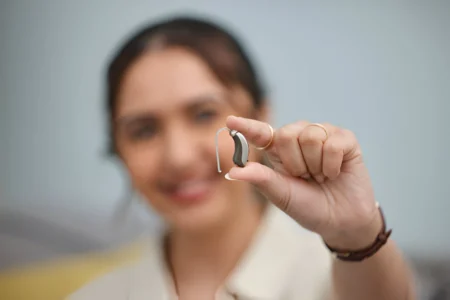What Is Tinnitus? Causes, Symptoms, and Treatment Options

Ever experienced a persistent ringing in your ears that just won’t go away? That’s tinnitus. It’s a common issue that can affect anyone, but it tends to become more noticeable as we age or if we’ve been exposed to loud noises over time. While tinnitus itself isn’t a disease, it can be a symptom of underlying hearing problems or other health conditions.
At Discover Hearing Centre, we specialize in helping individuals manage tinnitus effectively. Whether you’re experiencing occasional buzzing or constant ringing, understanding tinnitus is the first step toward relief.
Understanding Tinnitus
What Is Tinnitus?
Tinnitus is the perception of sound in the ears or head without an external source. It can manifest as ringing, buzzing, humming, or even clicking noises. Some people only notice it in quiet environments, while others find it interfering with daily life.
Types of Tinnitus
Tinnitus comes in two main types:
- Subjective tinnitus – The most common type, where only the person experiencing it can hear the noise.
- Noise-induced tinnitus: Prolonged exposure to loud noises can cause damage to the hair cells of your inner ear.
Who Is at Risk?
Tinnitus can affect anyone, but some groups are more at risk than others. This includes:
- Older adults experiencing hearing loss and aging
- Individuals exposed to noise-induced tinnitus from loud workplaces, concerts, or machinery
- People with ear infections, wax buildup, or TMJ disorders
- Those dealing with high blood pressure or conditions like Ménière’s disease
- Individuals taking certain medications known to cause tinnitus as a side effect
- People under high levels of stress or anxiety
Causes of Tinnitus
Hearing Loss and Aging
As we age, our hearing naturally declines. This can lead to hearing loss, which is often linked to tinnitus. The tiny hair cells in the inner ear become damaged over time, leading to changes in how we perceive sound. Learn more about hearing health and how it relates to tinnitus.
Noise-Induced Tinnitus
Repeated exposure to loud sounds—like concerts, construction sites, or even blasting music through headphones—can lead to noise-induced hearing loss. Protecting your ears with earplugs or reducing exposure can help prevent tinnitus from developing or worsening.
Ear Conditions and Infections
Blockages in the ear canal, such as earwax blockage and tinnitus, can sometimes cause or worsen ringing in the ears. Ear infections, TMJ disorders, and fluid buildup can also contribute.
Medical Conditions & Diseases
Conditions like Ménière’s disease, high blood pressure, and diabetes have been linked to tinnitus. Treating these conditions can sometimes help reduce symptoms.
Medication Side Effects
Certain medications, including some antibiotics, diuretics, and anti-inflammatory drugs, can be ototoxic, meaning they can damage the inner ear and lead to tinnitus.
Stress and Anxiety
Tinnitus is often aggravated by stress. Anxiety can heighten sensitivity to sound, making the ringing more noticeable. Addressing stress through relaxation techniques or therapy can sometimes provide relief.
Symptoms of Tinnitus
Common Sounds Experienced
Tinnitus isn’t just ringing—it can also sound like buzzing, hissing, clicking, or even roaring. Some people experience intermittent episodes, while for others, it’s constant.
When to See a Hearing Specialist
If your tinnitus is persistent, worsening, or accompanied by dizziness, hearing loss, or pain, it’s time to see a specialist. Seeking a professional evaluation can help rule out underlying conditions.
How Tinnitus Affects Daily Life
Tinnitus can impact sleep, concentration, and emotional well-being. Many people report difficulty focusing at work or feeling irritated due to the constant noise.
Diagnosing Tinnitus
Hearing Tests and Evaluations
Hearing specialists use audiometry tests to assess hearing ability. Tinnitus pitch and loudness matching can also help determine how severe the condition is.
Medical Imaging for Underlying Causes
If a hearing specialist suspects an underlying medical issue, CT scans or MRI imaging may be recommended to rule out conditions like tumours or circulatory disorders.
Consulting a Hearing Specialist
An expert evaluation is key to finding the right tinnitus treatment options. A specialist at Discover Hearing Centre can guide you through solutions tailored to your needs.
Also Read: 5 Exercises to Relieve Tinnitus
Tinnitus Treatment Options
Medical and Professional Treatments
There’s no one-size-fits-all cure for tinnitus, but many treatments can help:
- Hearing aids for tinnitus – Some hearing aids include built-in masking features that help reduce tinnitus perception. Can Hearing Aids Help with Tinnitus? Find Out How They Work
- Sound therapy – White noise machines, nature sounds, and white noise therapy can help mask the ringing.
Medications & Supplements
While no medication can cure tinnitus, some drugs or supplements may help manage symptoms, especially if linked to anxiety or sleep disturbances.
At-Home Remedies & Lifestyle Adjustments
Simple changes like a healthy diet, reducing caffeine and alcohol, and improving sleep hygiene can help lessen the impact of tinnitus.
Coping Strategies and Support
Hearing Aids
Hearing aids can counter balance the ringing, as many people suffering from tinnitus also have hearing loss.
Online and In-Person Support Groups
Connecting with others who experience tinnitus can be helpful. Support groups offer coping strategies and shared experiences.
Technology & Mobile Apps for Managing Tinnitus
Many apps provide soothing sounds, relaxation techniques, and tinnitus-tracking tools to help manage symptoms.
Prevention: Protecting Your Hearing
How to Reduce the Risk of Tinnitus
Prevention is key. Using ear protection in noisy environments and keeping headphone volume at safe levels can help prevent tinnitus from developing.
Healthy Habits for Long-Term Hearing Health
Regular exercise, a balanced diet, and stress management contribute to overall hearing health.
Regular Hearing Tests
Getting regular hearing check-ups at Discover Hearing Centre can help detect issues early and provide guidance on the best treatments for tinnitus. Does Tinnitus Get Worse With Age? Causes & Solutions
Frequently Asked Questions (FAQs)
Can Tinnitus Go Away on Its Own?
Sometimes, tinnitus resolves on its own, especially if caused by temporary factors like an ear infection or loud noise exposure.
Does Tinnitus Mean I’m Losing My Hearing?
Not always. While tinnitus is often linked to hearing loss, some people experience it without any significant hearing impairment.
What’s the Best Treatment for Tinnitus?
The best treatment depends on the cause and severity of your symptoms. Options include hearing aids for tinnitus, sound therapy, and tinnitus retraining therapy.
How Does Stress Affect Tinnitus?
Stress can heighten the perception of tinnitus. Managing stress through relaxation techniques and therapy can help reduce symptoms.
Are There Any New Tinnitus Treatments Being Developed?
Researchers continue to explore new treatments, including neuromodulation and innovative sound therapies.
Get Professional Tinnitus Help With Discover Hearing Centre
Tinnitus can be frustrating, but you don’t have to face it alone. Seeking professional help can make a significant difference in managing symptoms. If you’re experiencing tinnitus, schedule a consultation with Discover Hearing Centre today. Our experts can help you explore the best treatments for tinnitus, including hearing aids, white noise therapy, and tinnitus retraining therapy. Take the first step toward better hearing health!
Visit our hearing clinic in Kitchener and schedule a hearing test with our professional experts. We offer comprehensive audiology services, from hearing tests and education to digital hearing aids and personalized hearing loss treatments that put you and your specific hearing health needs at the centre. Whether you need a hearing test, are looking for invisible hearing aids or require help with hearing aid fittings and programming, Discover Hearing Centre is here for you.
Discover Hearing Centre is a local clinic specializing in the treatment of hearing loss; we’ve worked with hundreds of patients to help them maintain independence. Whether you’re experiencing hearing loss or tinnitus, we’re dedicated to improving your quality of life through better hearing. When you choose us, you choose a team committed to your well-being.
Call us today at 519-208-4327 or fill out our convenient online form to learn more about how we can help you with hearing loss issues.
You Might Also Like
Top 4 Major Causes of Hearing Loss
Does Tinnitus Get Worse With Age?
How Long Do Hearing Aids Last?
Have Questions?
Call our office if you have any questions about your hearing loss or anything else related to hearing. We are happy to help and answer any questions you may have.





